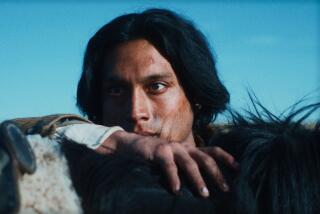Documentary Depicts Canadian UAW Strike
- Share via
The Academy of Motion Picture Arts and Sciences’ Contemporary Documentary Series continues Tuesday at 8 p.m. in UCLA’s Melnitz Theater with a pair of stunners, David Bradbury’s “Chile: Hasta Cuando?” (1986) and Sturla Gunnarsson’s “Final Offer” (1986).
“Final Offer” is that rarity, a documentary of an event as it is unfolding, which means that in this instance it plays like a nonfiction suspense film. Gunnarsson got permission to film Canada’s United Auto Workers officials in their 1984 contract talks with General Motors. What began as a routine negotiation turned into a dramatic confrontation with complex and broad implications.
The key setting is a suite in Toronto’s elegant old Royal York Hotel. Tough, smart, charismatic Canadian UAW president Bob White and his burly colleagues are appalled by what they consider a paltry offer in the wake of the company’s most profitable year in its history. White and his men believe their American counterparts have been cheated by an agreement tied to profit-sharing and decide to hold out for the traditional across-the-board pay raise. Very quickly White discovers that he has taken on not only GM but UAW international president Owen Bieber and must try to simultaneously stem wildcat strikes at GM’s Canadian plants and achieve unity among his lieutenants.
“Final Offer” is revealing in two crucial ways. First, its candid depiction of life on the assembly line shows us management and labor trapped by a dangerously antiquated system that pits them against each other over even the pettiest issues; this footage alone shows us why Japan is so far ahead of the United States with its more enlightened treatment of its workers. Second, it shows us a man gathering his strength to lead his forces in an assertion of Canada’s right to self-determination at a very real risk of bringing down an economic disaster upon his country. With the phone forever ringing on his desk, White, who is always impeccably dressed, is the guy keeping his cool on a burning deck. He’s involved in a kind of high-stakes poker. His special genius, along with breathtaking seat-of-the-pants courage and an ability to think on his feet, is to know just how far he can push GM, Bieber and his own men. Not the least, “Final Offer” is a portrait of a remarkable leader of men under fire.
Nominated for an Oscar, “Hasta Cuando?” has been previously reviewed. In making it, Bradbury, an Australian, told Chilean authorities that he intended to film a musical festival--and he did get a few words from a politically naive John Denver--but he went on to paint a damning portrait of life under a brutal dictatorship.
Information: (213) 825-2345, 2581.
UCLA Film Archives’ “New Yugoslav Film” concludes in Melnitz Theater with three more features and several repeats. All three are disappointing in various ways and degrees. Goran Markovic’s “Variola Vera” (Thursday at 5:30 p.m.) is an unduly melodramatic study of character under extreme pressure set in a Belgrade clinic quarantined because of an outbreak of smallpox. Anton Tomasic’s “Cormorant” (Sunday at 7:30 p.m.) is a relentless portrayal of an alcoholic sailor and his impact on his miserable family. To watch this film is to be punished rather than enlightened. Andrzej Mlakar’s “Christophoros,” which follows “Cormorant,” is an uneven but often affecting pastoral saga, beginning at the end of World War II. What’s been most impressive about this grueling series is not the quality of the films (which mostly leave much to be desired) but their freedom of expression.
Gay ‘90s nostalgia was a World War II staple, but RKO’s “Belle of the Yukon” (1944), which screens Sunday and next Monday, at the Los Feliz with “My Gal Sal,” is surely one of the best--and least-known--examples. Directed with a brisk, light touch by William Seiter and adapted by James Edward Grant from a story by Houston Branch, this sparkling, witty comedy features a bunch of shady types on the Alaska frontier--Randolph Scott, Gypsy Rose Lee (in the title role) and William Marshall. The innocent of the piece is Dinah Shore, who sings a number of fine songs, including Johnny Burke and Jimmy Van Heusen’s Oscar-nominated “Sleighride in July.” Don Loper did the splendidly stylized settings, costumes and choreography, all of which glow in a gorgeous new Technicolor print.
Information: (213) 664-2169.
More to Read
The biggest entertainment stories
Get our big stories about Hollywood, film, television, music, arts, culture and more right in your inbox as soon as they publish.
You may occasionally receive promotional content from the Los Angeles Times.










